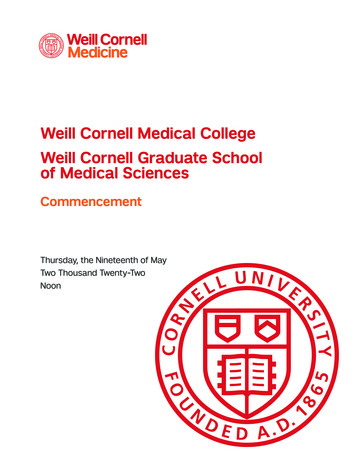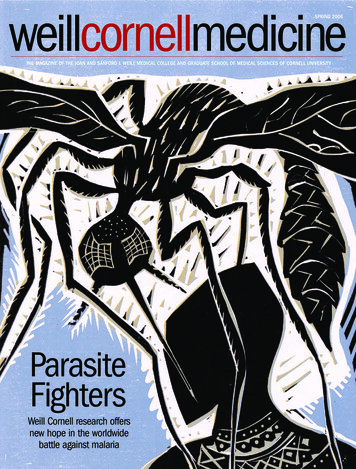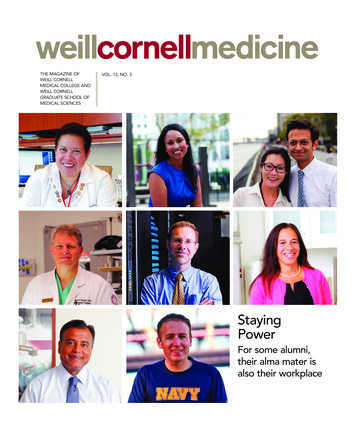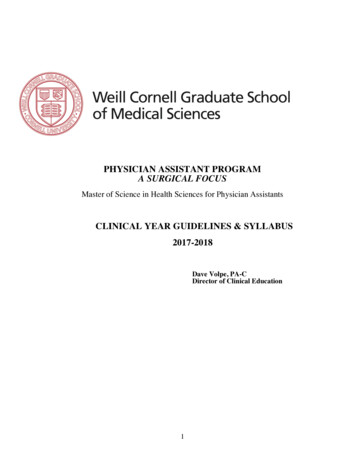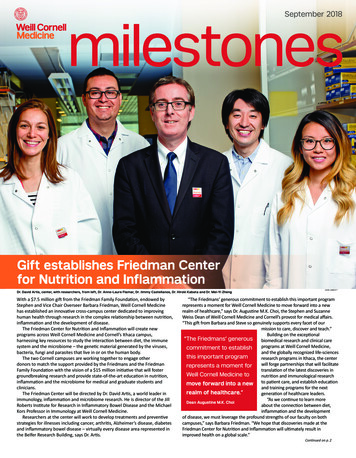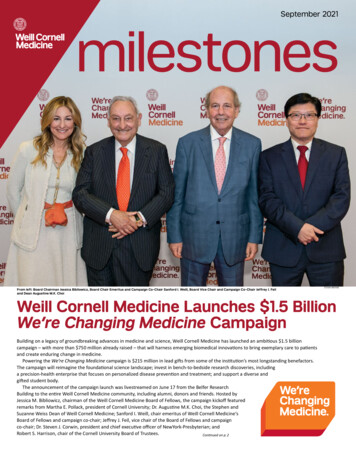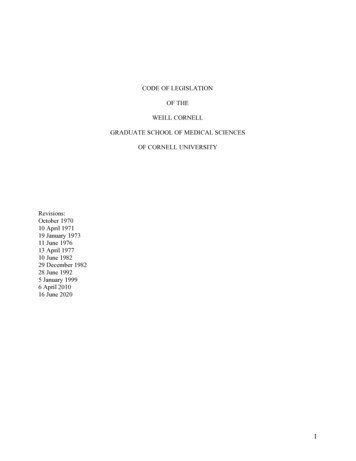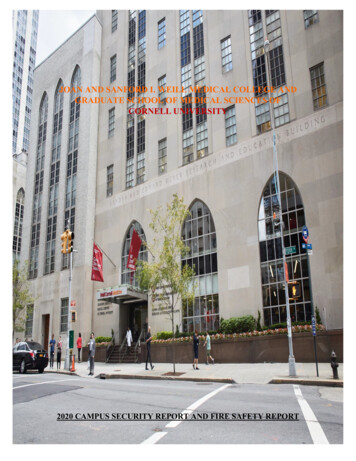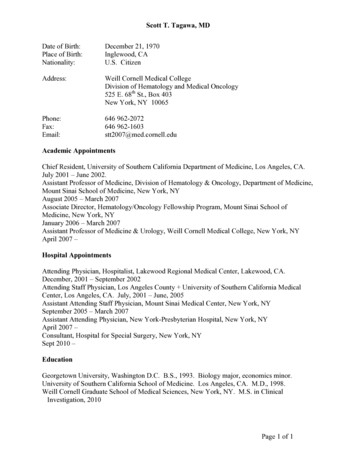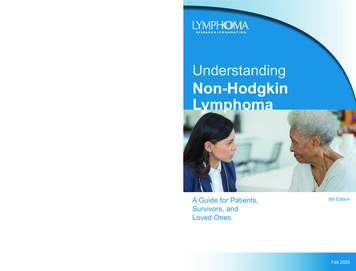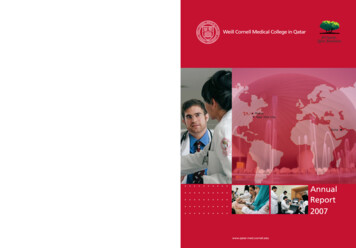
Transcription
WEILL CORNELL MEDICAL COLLEGE IN QATARANNUAL REPORT 2007
ContentsLeadership Report1Joint Advisory Board5Education6Patient stics30Leadership34Chronology36Weill Cornell Medical College in Qatar was jointly established bythe Qatar Foundation for Education, Science and Community Developmentand Cornell UniversityPhotography: Martin Marion, WCMC-Q; Weill Cornell Art & Photo; Qatar Foundation; Fouad Otaki ‘09; MSEC-Q
Weill Cornell Medical College in QatarLeadership Reportfor the Year July 1, 2006 to June 30, 2007Committed to excellence in education, research and patient care,and to the advancement of the art and science of medicine.The year saw important progress in all aspects ofour triple mission. Together with our partnersin Qatar – Hamad Medical Corporation(HMC) and Qatar Foundation – WCMC-Q achievedsome notable milestones, during a period that wasextraordinary for Qatar as a whole with the landmarkevent of the Asian Games.It was a proud moment for WCMC-Q when thesixteen members of the Inaugural Class steppedinto the clinical phase of the Medical Program inHMC facilities in July. Following a major effort ofplanning and preparation by the Medical Collegeand HMC, the clinical clerkships were off to a goodstart and progressed well.They represent a significant step forwardin the education of our medical students, andtherefore in the formation of the next generation ofDr. Daniel R. Alonsophysicians in Qatar and the region. In the contextof the Middle East, the Weill Cornell curriculum ishighly unusual for its early introduction to patientof the Class of 2008 step out of the Medical Collegecare, and it is noteworthy that the class membersbuilding and into the hospital environment duringwere the first Weill Cornell medical students tothe year – they also flew to the U.S. to work in one ofrotate among HMC departments as part of theirthe country’s top hospitals.education for the M.D. degree.On the research front, there were notableMeanwhile, WCMC-Q faculty and staff workedachievements. The research laboratories becameclosely with Weill Cornell Medical College in Newoperational in summer 2006, as Weill Cornell andYork City and NewYork-Presbyterian Hospital toHMC physician-scientists and WCMC-Q medicalplan the Year Four electives and sub-internships,students worked on a proof of concept projectwhich began in June 2007. Not only did membersbetween Doha and New York.1
2Weill Cornell Medical College in QatarThe partnership with HMC is essential to thesuccess of the clinical clerkships. Here, Dr. ZiadResearch Program. It is with pleasure that I noteKronfol and Dr. Tuna Burgut are seen withgrowing enthusiasm among the student body,members of the Class of 2008 at the start of theguided by faculty mentors, for research: First-yearPsychiatry Clerkship in the spring semester.pre-medical students were among those to receiveUREP funding.In September, WCMC-Q presented a proposalThe partnership with HMC was furtherfor a Biomedical Research Program to Qatarstrengthened as the first WCMC-Q clinical facultyFoundation – taking the Medical College a stepmembers were licensed by the National Healthcloser to establishing a program that will make aAuthority and credentialed to see patients in HMCpositive contribution both to the health and qualityfacilities during the year. Five faculty membersof life of the people of Qatar and to building thewere actively involved in clinical practice bycountry’s research capacity.June 30. At the same time, the number of HMCFurther developments on the research front,including the establishment of Qatar uate(UREP),addedResearchtophysicians appointed to the faculty increased, witha growth in the range of specialties represented.Undoubtedly, WCMC-Q’s medical students andthefaculty also benefited from milestone achievementsopportunities for research that WCMC-Q hasby HMC during the year, notably the accreditationoffered students since the first year of the Summerby the Joint Commission International of its five
Leadership ReportQatar Foundation’s Sidra Medical and Researchhospitals and the opening of a new, state-of-theart Education Center.Center, planned to open in 2011, will be a stunningaddition to the Education City campus.The year saw the unveiling of the architecturalplans, and the new name, for Qatar Foundation’sencouraging and showed that the effort to reach outSidra Medical and Research Center. Among the mostto this constituency was well focussed.exciting projects for the coming period in Qatar,It gives me great pleasure to document theSidra will be a landmark hospital and researchoutreach activities in a new section in this year’sfacility and a partner of WCMC-Q in medicalreport, bringing together the various strands ofeducation, patient care and biomedical research.effort so enthusiastically pursued by our faculty,Senior personnel of Weill Cornell Medicalstudents and staff.College in both the U.S. and Qatar, and of NewYork-Looking ahead to the coming year, I note withPresbyterian Hospital, are supporting and advisinggreat pleasure that WCMC-Q is now moving intoin the development of the clinical programs and thethe final stage of implementation of the six-yearinternal configuration for Sidra, which is projectedprogram of pre-medical and medical education.to open in 2011. Together, WCMC-Q and Sidra willThere is much to anticipate in the coming periodbe key elements of a world-class academic medical– notably the graduation of the Inaugural Class incenter located on the Education City campus.spring 2008, as well as continuing progress in otherAmong other important activities during theaspects of our mission.year, faculty and staff of the Medical College workedhard to reach the wider community in Qatar. Wewere pleased to record a significant increase inapplications from Qatari students to WCMC-Q.Daniel R. Alonso, M.D.Added to this, results of the pilot FoundationDeanProgram for students from local schools wereWeill Cornell Medical College in Qatar3
Soaring into the soft evening light:Subtle geometric patterns play offthe strong linear features of theMedical College building.
Joint Advisory BoardJoint Advisory Board, 2006 – 2007TMembers of the Joint Advisory Board: (left to right)Ms. Havva S. Idriss, Dr. John A. Cairns, Dr. Abdulla A.he Joint Advisory Board of WCMC-Q comprisesAl-Thani, Dr. Daniel R. Alonso, Mr. James J. Mingle,four members appointed by Cornell University, fourMr. Sanford I. Weill, Sir Christopher Paine,members appointed by Qatar Foundation and threeH.E. Dr. Ghalia Bint Mohammed Al-Thani,additional, external members jointly appointed by CornellDr. Mohammad Fathy Saoud, Dr. Antonio M. Gotto, Jr.,and Qatar Foundation. Mr. Sanford I. Weill, Chairman ofMr. Steven P. Rosalie, Dr. Jordan J. Cohen, Dr. Sheikhathe Board of Overseers of Weill Cornell Medical College,Al-Misnad and Dr. Jassim Al Suwaidi.the Dean and Vice Dean of WCMC-Q, and Dr. Abdulla A.Absent from the picture: Mrs. Barbara B. Friedman.Al-Thani are non-voting ex officio members.Qatar FoundationRepresentatives:Cornell es:H.E. Hajar A. Hajar Al-Binali, M.D.Antonio M. Gotto, Jr., M.D., D.Phil.John A. Cairns, M.D., F.R.C.P.C.Co-ChairProvost for Medical Affairs and DeanWeill Cornell Medical CollegeProfessor of Cardiology, Faculty of MedicineUniversity of British ColumbiaMrs. Barbara B. FriedmanPresident EmeritusAssociation of American Medical CollegesCo-Chair (until March 2007)Minister & Advisor on Public Health Affairsto H.H. the EmirH.E. Ghalia Bint Mohammed Al-Thani, M.D.Co-Chair (from March 2007)ChairpersonBoard of Directors, National Health AuthorityJassim Al Suwaidi, M.B. Ch.B. B.A.O.,L.R.C.P. & S.I. (Honors)Consultant CardiologistHamad Medical CorporationSheikha Al-Misnad, Ph.D.President, Qatar UniversityBoard Member, Qatar Foundation for Education,Science & Community DevelopmentMohammad Fathy Saoud, Ph.D.Board Member and Higher Education AdvisorQatar Foundation for Education, Science &Community DevelopmentVice Chair, Board of OverseersWeill Cornell Medical CollegeJames J. Mingle, Esq.University Counseland Secretary of the CorporationCornell UniversityJordan J. Cohen, M.D.Sir Christopher Paine, D.M., F.R.C.P.Former PresidentBritish Medical AssociationMr. Steven P. RosalieAssociate Provost for International Initiatives& Executive Vice DeanWeill Cornell Medical CollegeEx Officio Members:Daniel R. Alonso, M.D.Ms. Havva S. IdrissDeanWeill Cornell Medical College in QatarVice Dean, AdministrationWeill Cornell Medical College in QatarAbdulla A. Al-Thani, Ph.D.Mr. Sanford I. WeillVice President - EducationQatar Foundation for Education, Science& Community DevelopmentChairman, Board of OverseersWeill Cornell Medical College5
6Weill Cornell Medical College in QatarEducationThe Inaugural Class began the third year clinical clerkships in Hamad MedicalCorporation facilities in July 2006. This new, clinical phase of the Medical Programmoved into its final stage in June 2007, as class members flew to the U.S. to startelectives and sub-internships in NewYork-Presbyterian Hospital/Weill CornellMedical Center. During the spring semester, WCMC-Q piloted a FoundationProgram for potential pre-medical students to help them benefit from intensiveEnglish-language and science teaching before joining the Pre-medical Program.Medical EducationTlaying the groundwork for the clinical education ofWCMC-Q’s medical students.he Medical Program moved into the clinicalIn contrast to their experience during the basicphase on July 9, 2006 with the start of the Yearsciences phase of the Medical Program, members3 clinical clerkships. During the following 11of the Class of 2008 spent most of their time outsidemonths, the Inaugural Class successfully completedthe Medical College during the year under review.six out of nine required clerkships, in internalAssigned to teams of physicians in HMC hospitals andmedicine, obstetrics and gynecology, pediatrics,clinics, they moved between a number of sites in Dohasurgery (including anesthesia), neurology andand the northern town of Al Khor. These includedpsychiatry.Hamad General Hospital, the Women’s Hospital, themedicine,Psychiatric Hospital, Al Sadd Pediatric Emergencyobstetrics and gynecology, and pediatrics had beenCenter, two Primary Health Care Centers and Al Khorappointed during the previous year. They wereHospital. In addition, a number of sessions of thenow joined by Dr. Bakr Nour, professor and VicePsychiatry Clerkship took place at Shafallah Center, aChairman of Surgery and Director of the Surgeryfacility for children with special needs.ClerkshipdirectorsforinternalClerkship; and Dr. Ziad Kronfol and Dr. Tuna Burgut,As the clerkships progressed, the medical studentsassistant professors of psychiatry and Co-Directorsfitted in well. In contrast to the system in the U.S.,of the Psychiatry Clerkship.where clerks are the junior members of a complexIn addition, Dr. Leopold Streletz, associatehierarchy rising from intern through several levelsprofessor of neurology and neuroscience since 200 5,of resident up to attending physicians (consultants),was appointed to the post of Neurology ClerkshipWCMC-Q’s clerks were generally paired withDirector.consultant physicians at HMC. In the surgeryOversight of the clinical clerkships was theresponsibility of Dr. Nounou Taleghani, Associateclerkship, their contact was always one-on-one withthe consultant.Dean for Clinical Curriculum. Working closelyThe clerks benefited from working in very busywith the clerkship directors, and staff of HMC’shealth-care facilities, with consequent exposureDepartment of Medical Education led by Actingto a wide range of cases. They were able to have aDirector Dr. Abdul Latif Al Khal, as well as withsignificant amount of contact with patients and toheads of department and program directors atfollow them from admission to discharge, carrying aHMC, Dr. Taleghani and her team succeeded indegree of responsibility for their care. The experience
During the year, members of the Class of 2008completed six out of nine required clerkships in thealso familiarized the clerks further with teamwork infacilities of Hamad Medical Corporation.the hospital and clinic environment, building on theearly experience gained in the Medicine, Patients andSociety I and II courses.Cornell Medical College in New York City, and theIn addition to work at the bedside, they attendeddailydidacticsessionsoncetheirDepartments of Medical Education, InformationclerkshipTechnology and Health Information Systems at HMCresponsibilities in the hospital or clinic werewere closely involved, with information technologycompleted.staff of WCMC-Q acting as the focal point.The sessions replicated the learning experience ofTwo rooms on the New York campus weremedical students at Weill Cornell Medical Collegeequipped with a range of functionalities (e.g.in New York City. Some were led by WCMC-Qelectronic whiteboard and smartboard), supportedclerkship directors; others were delivered by pre-by the capability for digital transfer of the teachingrecorded lectures received from New York; yetmaterials from New York to Doha. The availability ofothers took place by video conferencing betweenvideo conferencing facilities for live teaching betweenDoha and New York – among them the weeklythe sites enhanced the learning experience for facultyProfessor’s Rounds, case discussions by seniorand students in the clinical and, indeed, in the basicclinical faculty of NewYork-Presbyterian/Weillscience, components of the curriculum.Cornell Medical Center.During the year, HMC upgraded its existingThe technological capability to support liveaudiovisual technologies for multi-site conferences.sessions between centers that are geographically farThe new Education Center, situated on the main HMCapart was developed following intensive preparationsite and commissioned in spring 2007, was equippedfrom 2005. Senior members of the Offices of Medicalwith the A/V functionalities required to support theEducation and Information Technology at Weillclerkships. WCMC-Q staff assisted in ensuring that
8Weill Cornell Medical College in Qatarthe systems were in place and fully tested in advanceDepartment of Medical Education in developingof the Center’s opening.and presenting workshops and seminars inIn general, the difference in time between Newbibliographic instruction.York and Doha worked to everyone’s advantage:Meanwhile, the Office of Educational Development,Early morning sessions on the U.S. side fitted wellestablished in July 2006, began to review and revise thewith the afternoon didactic sessions in Qatar.assessment materials for the clerkships. Staff workedThe Education Center is of significant benefit towith the clerkship directors to revise the form used toWCMC-Q’s clerks. A two-story, 3500 square meterevaluate student learning to incorporate direct meas-facility with state-of-the-art learning technologies,urement of Accreditation Council on Graduate Medicalas well as student lounges and office space, it hasEducation (ACGME) general competencies.the added benefit of being a focal point for HMC’shealth-care professionals.Preparations for the fourth yearWith medical students now working off-site andAs the year progressed, plans were put in placea growing number of WCMC-Q faculty at HMC,for the fourth and final year of the program, with itsprovision of electronic information resources wascombination of required clerkships, electives, sub-given more emphasis. The number of ebooks andinternship and advanced basic science ibrary (DeLib) increased to almost 10,000.DeLib staff also worked closely with the HMCThis is the stage when medical students begin theprocess of moving on to residencies in their chosenspecialty. The choice of electives and sub-internshipAn integral part of the clinical clerkships, daily educational sessions were held in HMC throughout the year. Here, professor of surgeryand Director of the Surgery Clerkship, Dr. Bakr Nour, leads a case discussion.
Educationshould be made with careful regard to how theyPecker, professor of clinical medicine, Vice Chairmanwould support a residency application.of Educational Affairs, and Director of the ResidencyThe fourth year therefore allows for a degree ofProgram at NewYork-Presbyterian/Weill Cornellflexibility in choice of clinical experience. Further,Medical Center. In addition, each student wasWCMC-Q’s medical students may choose to divideallocated a faculty advisor in their field of choice ontheir time between the U.S. and Qatar, since they canthe U.S. side.apply for electives in either country – including upAlmost all the class members traveled to Newto three months of electives and sub-internships atYork to begin an elective, or a sub-internship inWeill Cornell-affiliated hospitals in the U.S.internal medicine, at the beginning of June 2007.Class members were counseled and supportedEarly feedback showed that they adjusted well: Thein planning their career choices, obtaining theiradvice and support provided by WCMC-Q facultypreferred electives, and preparing to travel andproved to have been a sound preparation.work in a new environment by Dr. Taleghani;medical faculty members; and staff of the Office ofBasic sciences: live lectures pilotedAdmissions and Student Affairs, led by associateWhile teaching in the basic science phase of theprofessor of obstetrics and gynecology, Dr. MayaMedical Program continued to run largely accordingHammoud, who took up the position of Associateto the pattern set in previous years, one challenge inDean in fall 2006.fall 2006 was to accommodate the timetable aroundConsiderable assistance was given by Dr. Mark S.the Asian Games in December.HMC’s new Education Center, commissioned in the spring, provides state-of-the-art facilities for the HMC community and WCMC-Q’sdoctors-in-training.9
10Weill Cornell Medical College in QatarTeaching in the Pre-medical Program entered itsfifth year in fall 2006, and the entering class wasas internationally diverse and as talented as itspredecessors.During the year, course directors were appointedas follows: Dr. Ali Sultan, assistant professor ofmicrobiology and immunology – Host Defenses; Dr.Many aspects of life in Doha were affectedthroughout the fall by the Games. For WCMC-Q, itmeant that teaching in the Pre-medical Program beganearlier than usual and teaching in the Medical ProgramLars Hedin, associate professor of physiology andbiophysics – Human Structure and Function.Pre-medical Educationhad to be worked in around the event. Staff in the OfficeTeaching in the Pre-medical Program entered theof Curriculum Support worked hard to ensure that thefifth year in August 2006. From the fall semester, aunusual circumstances could be accommodated.personal response system (PRS) was introduced inThe year saw a departure from the establishedthe lecture halls as a teaching and evaluation aide.mode of bringing to WCMC-Q the lectures givenWidely used at Cornell University in Ithaca, theby faculty on the New York campus. Previously,PRS provides instant and individualized checksthey were recorded in the auditoria as they wereon students’ grasp of concepts before and duringdelivered to the medical students in New Yorkteaching, as well as feedback in quizzes.and videostreamed at a later date in WCMC-Q.Following a series of discussions between Dr.Question and answer sessions were scheduledDavid Robertshaw, Associate Dean, and Dr. Marcoonce a week by video conferencing, some timeAmeduri, Assistant Dean, for Pre-medical Educationafter the lectures.and staff of the Office of Educational Development,The availability of dedicated rooms at Weill Cornellthe forms used by students for evaluation of coursesin New York City meant that more teaching by videoand faculty in the Pre-medical Program were revisedconferencing between the U.S. and Qatar sites wasin time for the start of teaching in fall 2007.now possible. In the spring semester, WCMC-QThere was significant growth during the yearsuccessfully piloted the delivery of a number of livein outreach activities among science teachers inlectures in the first year Host Defenses course. Therelocal schools, organized by faculty members inare now plans to extend this mode of delivery tocollaboration with colleagues at Qatar Universityselected lectures in all the basic science courses.(see: Outreach, page 28).
WCMC-Q faculty and students enjoy a world-classlearning environment. Here, professor of chemistry,Dr. Terrance Murphy, is seen delivering a lecture tofirst-year pre-meds.
12Weill Cornell Medical College in QatarFoundation Programsuccessfully pilotedThe spring semester saw the launchof a pilot program for students of QatarFoundation’s Academic Bridge Programwho had expressed an interest in applyingto WCMC-Q.Directed by senior lecturer in physics,Dr. Imad Makki, the 16-week pilot programcomprised intensive teaching in the sciencesbasic to medicine and English. Emphasiswas placed on enhancing students’ skillsof analysis and critical thinking, and theirknowledge of the vocabulary of science.A majority of the participants who completed the program went on to successfullyenroll in the Pre-medical Program; meanwhile, plans were under development tooffer a one-year Foundation Program forhigh school graduates from fall 2007 (see:(Above) Work in the laboratory is an integral part ofthe learning experience of pre-medical students.(Below) Participants in the pilot Foundation Program,seen with Dean Alonso and Dr. Hammoud (center),and Dr. Imad Makki, Director of the program (right),after receiving certificates of completion.Students, page 25).
EducationDeLib services enhancedWorking to support the operations of WCMC-QStreamlining of DeLib operations was supportedacross the spectrum, staff of the DeLib, with theby the Office of Information Technology Services,support of colleagues in the Office of Informationnotably with the launch of the WCMC-Q PortalTechnology Services, implemented a number ofin July. This was the first step in a major project toimprovements in services for faculty and students.deliver information to the WCMC-Q communityThe provision of a full video chat service to DeLibthrough a single gateway, with the capacity forusers moved a step closer with installation of trialpersonalized presentation.video chat facilities at selected computer stationsWith the increase in the number of WCMC-Qin the WCMC-Q building. Adding to the existingusers at Hamad Medical Corporation, DeLib staffcapability for rapid location and downloading ofworked with colleagues at Hamad Health Sciencesinformation resources requested by email or voice,Library (HHSL) on the implementation of a newthe service will enhance users’ interaction withintegrated library system for HHSL. System trainingDeLib staff.and guidance were offered, as well as assistancePlans also proceeded to incorporate new software(TDNet) for seamless searching of all electronicin the conversion of data to a format suitable fortransfer to the new system.books and journals held by the Medical College.Interaction with DeLib staff was enhanced during theyear by the successful trial of a full video chat service.13
14Weill Cornell Medical College in QatarVisiting expert in cardiovascular medicine fromNewYork-Presbyterian/Weill Cornell Medical Center,Dr. Jeffrey Borer, delivered Grand Rounds at HMCin January.
Patient Care15Patient CareThe year saw the licensing and credentialing of the first faculty members to workas clinicians at Hamad Medical Corporation, and an increase in the number of HMCphysicians appointed to the faculty of WCMC-Q. Qatar Foundation unveiled thespectacular architectural plans and announced the new name for the Sidra Medicaland Research Center, to be built on the Education City campus.The first senior appointment was made to thegenetics; Dr. Leopold Streletz, associate professor ofOffice of Clinical Affairs during the year, asneurology and neuroscience; Dr. Powers Peterson,professor of medicine, Dr. Bruce Davidson,associate professor of pathology and laboratoryreturned to Doha to take up the post of Seniormedicine; Dr. Nasir Hussain, associate professor ofAssociate Dean. He had previously spent one monthinternal medicine; Dr. Maya Hammoud, associateat WCMC-Q in the summer of 2006, to assist inprofessor of obstetrics and gynecology; Dr. Nadysetting up the Medicine Clerkship.Mohamed, assistant professor of obstetrics andGrowing cooperation withHamad Medical Corporationgynecology; Dr. Amal Khidir, assistant professorof pediatrics; and Dr. Mai Mahmoud, instructor ininternal medicine.Ten faculty members were licensed by theBy summer 2007, five of the faculty – Drs.National Health Authority and credentialed toDavidson, Mohamed, Nour, Mahmoud and Streletzwork at Hamad Medical Corporation. They were:– were regularly involved in clinical activities at theDr. Davidson; Dr. Bakr Nour, professor of surgeryHamad General and/or Women’s Hospitals. Theseand an expert in the field of transplant surgery;activities included seeing patients in teaching clinics;Dr. Ahmad Teebi, professor of pediatrics and ofHMC physicians appointed to the faculty of WCMC-Q tookpart in the clinical education of medical students throughoutthe year, among them Dr. Dirk Deleu, Chief of HMC’sneurology division, seen in discussion with Dr. LeopoldStreletz and third year students.
16Weill Cornell Medical College in QatarDr. M. Flint Beal gave a research seminar during his visitto WCMC-Q.Dr. Thomas Sculco discussed a possible affiliation withQatar Orthopedic and Sports Medicine Hospital (ASPETAR)while in Doha.working in the medical intensive care unit; carryingCenter visited Qatar and held meetings without procedures, including complex surgeries; andcolleagues at HMC.participating in rounds.The visitors included Dr. M. Flint Beal, TheA total of five HMC hospitals were granted accredi-Anne Parrish Titzell Professor and Chairman oftation by the Joint Commission International (JCI). Thisthe Department of Neurology and Neuroscience atwas a milestone for the Corporation, signifying thatWeill Cornell and Director of the Neurology ServiceHamad General, the Women’s, Al Amal, Rumailahat NewYork-Presbyterian Hospital. In meetings withand Al Khor Hospitals had met the exacting interna-clinicians at HMC, he explored ways to strengthentional standards set by the JCI. The achievement wasneurology care for patients in Qatar and a possiblethe result of diligent effort by the leadership and staff offuture residency training program in the specialty.HMC, and testament to their commitment to meetingDr. Jeffrey Borer, The Gladys and Roland Harrimanthe highest standards of patient care.Professor of Cardiovascular Medicine, and professorDuring the year, the HMC Department of Medicalof radiology and of cardiothoracic surgery, and ChairEducation worked with WCMC-Q to encourageof the Division of Cardiovascular Pathophysiologyphysicians to apply for appointments as faculty ofand The Howard Gilman Institute for Valvular Heartthe Medical College. The number of HMC physiciansDiseases, came to Doha in January.holding WCMC-Q faculty appointments rose to 88,Visiting Doha, in April, was Dr. Thomas Sculco,at ranks from clinical instructor to clinical professorprofessor of orthopedic surgery, Chairman of(see also: Faculty, page 22).the Department of Orthopedic Surgery at WeillA number of senior clinical faculty membersCornell Medical College, and Surgeon-in-Chieffrom NewYork-Presbyterian/Weill Cornell Medicalat the Hospital for Special Surgery in New York.
Patient CareDr. Sculco took part in rounds and discussed aing environment, notably by the creation of gardenspossible international elective in HMC’s orthopedicin three towers, visible from every in-patient room.department for students at the Medical College inNew York City.While in Doha, Dr. Sculco visited Qatar Orthopedic and Sports Medicine Hospital (ASPETAR),Biomedical and clinical research will be carried outin an outpatient building to the west of the hospital,with an adjoining second outpatient building plannedfor construction at a later date.part of an elite athlete training facility located inMeanwhile, planning of the hospital’s internal con-Doha Sports City, which hosted the Asian Games.figuration moved ahead. Appointed by Dean AlonsoAmong the topics discussed was a possible affiliationto act as a liaison in advising the Sidra Executive Projectbetween ASPETAR and the Hospital for Special Sur-Director and his team, Dr. Davidson gathered inputgery, which has a sports medicine department.from departmental Chairs at Weill Cornell MedicalSidra Medical andResearch Center announcedCollege and NewYork-Presbyterian Hospital.Together with experts from Hamad MedicalCorporation, they contributed to discussion of theIn March, Qatar Foundation unveiled thefacility’s clinical functioning in key areas, includingarchitectural plans for the teaching and researchwomen’s health, pediatrics, medicine, surgery, andhospital to be built on a site in Education City tosupporting services such as radiology, laboratoriesthe north of WCMC-Q. It was announced that theand the emergency department.facility would be named the Sidra Medical andResearch Center.Once Sidra Medical and Research Center opens,it will form, together with WCMC-Q, an academicThe remarkable structure is designed by renownedmedical and research center of the highest qual-architect Cesar Pelli of Pelli Clarke Pelli; the executiveity based on the successful academic medical centerarchitectural firm is Ellerbe Becket. Sidra will be con-model. Joining forces with Hamad Medical Corpora-structed of steel, glass and concrete; the design (below)tion, Sidra and WCMC-Q will unite in a collaborativecomplements state-of-the-art technology with a heal-effort entitled “o
Board Member and Higher Education Advisor Daniel R. Alonso, M.D. Qatar Foundation for Education, Science & Community Development Cornell University Representatives: Antonio M. Gotto, Jr., M.D., D.Phil. Co-Chair Provost for Medical Affairs and Dean Weill Cornell Medical College Mrs. Barbara B. Friedman Vice Chair, Board of Overseers
